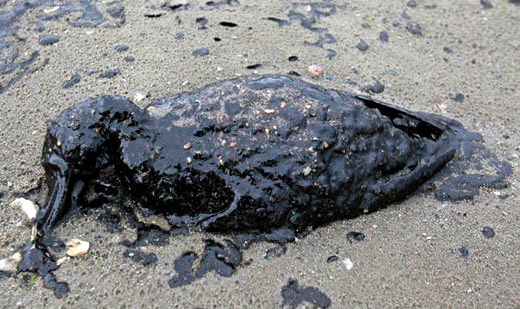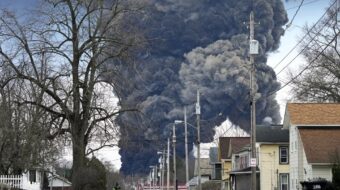
TEXAS CITY, Texas – Only a day before the anniversary of the terrible Exxon Valdez oil spill, and a day before the ninth anniversary of the death of 15 in an oil explosion, a collision occurred here Mar. 23 between a barge and a vessel in the Houston Ship Channel.
It sent 170,000 gallons of oil into the body of water that connects the Galveston Bay and the Gulf of Mexico and deals with up to 80 vessels per day. The disaster continues to unfold as the channel blackens and experts rush to determine the cause of the crash.
The U.S. Coast Guard has warned that the oil spilled is a particularly troublesome mixture – a special “bunker fuel oil” called RMG 380, which does not evaporate quickly and which contains volatile chemicals. Officials are closely monitoring air quality for harmful contaminants the oil might release. “This is an extremely serious spill,” said Coast Guard Capt. Brian Penoyer. “It is a persistent oil. We need to hit it hard and fast now before it disperses and thins out.”
But it may already be too late for that. The day after the spill, “tar balls” were discovered on the shore of Galveston Bay, showing that the oil had quickly spread outward from the channel into neighboring bodies of water.
The vessel, Summer Wind, was a Liberian merchant ship owned by Greece-based Cleopatra Shipping. It was being towed during foggy conditions when the barge, owned by the Houston-based Kirby Inland Marine Corp., collided with it, though it is not yet certain what chain of events led to the collision – that’s something that investigators with the National Transportation Safety Board are currently trying to determine.
Other repercussions of the disaster are already being seen, as at least fifty birds were covered in oil and needed emergency treatment. Seven more, meanwhile, died as a result of being poisoned by the spill. More wildlife casualties are likely forthcoming, as thousands of wintering birds remain in the immediate area. Even worse, the site is located just east of the Bolivar Flats Shorebird Sanctuary, a preserved bird refuge that is home to ducks, geese, herons, and other water fowl. It typically attracts 50,000 to 70,000 birds this time of year.
Richard Gibbons, conservation director of Houston Audubon, remarked, “This spill is very, very close to a lot of very, very important places for birds. The timing couldn’t be much worse since we’re approaching the peak shorebird migration season. We’re concerned about all the birds that are oiled. It’s something we have to be diligent with.”
The threat posed to the sanctuary is only the latest in a string of seemingly unending accidents that have made disaster and even death a part of almost every life in Texas City, which is home to the nation’s third-largest oil refinery – a source of danger to both workers at the plant and on the docks, and to the rest of the community.
People on the streets talk about the many disasters over the years there, in terms like “my explosion” in 2005 and “my dad’s explosion” in 1947. For Michael Strelnick, who works construction jobs, a clear, mild spring afternoon in 2005 was spoiled when, on Mar. 24, fire storms tore through the BP plant on the edge of town, rocking the street beneath his feet and filling the air he breathed with thick, toxic smoke. Fifteen people were killed, four more than were killed five years later on the Deepwater Horizon.
The Gulf of Mexico has yet to recover from that disaster, the biggest oil spill in U.S. history. In stark contrast to this disturbing fact, the EPA lifted the ban that prevented BP from engaging in new contracts with the federal government, essentially allowing the corporation to resume drilling activities in the Gulf. The EPA has also lifted restrictions on the plant in town that BP eventually sold to Marathon Oil.
“What can you do?” Strelnick said. “If it weren’t for the oil business, we’d have absolutely nothing here. It’s just sad that we have to live this way. The price we pay for some jobs and money for a local community center chipped in by the oil companies is that we have to live with these continuous disasters.”
Workers at the plant that exploded, now owned by Marathon Oil, told the People’s World that BP went on a penny pinching campaign prior to the deadly explosion in 2005. The company cut inspections to save $1 million, eliminated “safety calendars” to save $40,000, and eliminated safety shoes for employees to save $75,000, according to the workers.
“Then came the explosion, and 15 people were dead,” said Laura McCollum, who does safety inspection work for her union, Local 13-1 of the Steelworkers, which represents oil and chemical workers. She worries that the town could be in store for another death-dealing oil disaster. She explained that, for a while after the 2005 disaster, the Occupational Safety and Health Administration kept sending monthly inspectors and BP grudgingly followed some safety rules. The response now, from Marathon, which purchased the plant from BP, is “the regulators are off our backs and it’s time for us to make money.
“People were killed because they were housed in trailers too close to the dangerous facilities. Glass and metal tore through their bodies. And now, today, the workers are housed in tents. That’s a problem.”
Marathon claims tents are safer because, unlike trailers, they won’t kill the workers inside if they fall on top of them. “It’s that kind of attitude by management at the world’s third largest refinery that had us worried here,” she said. “Without a change in that attitude, we could end up with yet another really big Texas City disaster.”
Photo: An oil-drenched bird, just one more victim of the oil disasters in Texas City, lies dead on the eastern shore of Galveston Bay. AP













Comments